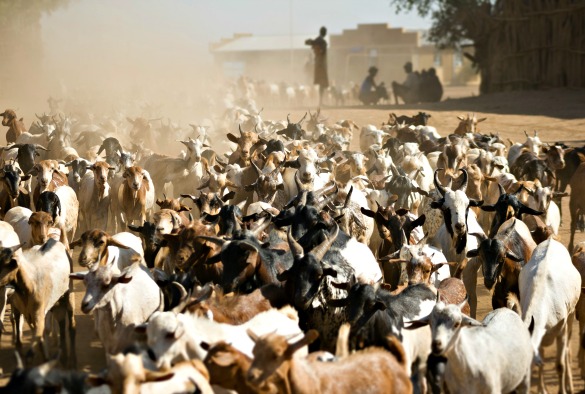Jonathan Rushton, Professor of Animal Health and Food Systems Economics, and Programme Director of the Global Burden of Animal Diseases (GBADs) programme, has co-authored an editorial piece for The Lancet regarding the roll-out of the GBADs programme:
“With continuing population growth and rising demand for food, livestock and aquaculture are integral to improving food and nutrition security, health, and livelihoods. These positive contributions are being undermined, however, by the negative effects of livestock production and consumption on society and the environment—e.g., production of greenhouse gases, environmental degradation, emergence of zoonotic diseases, and antimicrobial resistance. Furthermore, excessive consumption of some livestock products is linked to risk of non-communicable diseases.
“There is little evidence available for addressing these concerns through improving livestock production and animal health systems, and no systematic approach to understanding global livestock populations and the resources invested in animals by societies globally. Knowledge of the major constraints on livestock productivity and the means to address them are insufficient, and there is a need for robust assessments of the impact of livestock on food security, disease risks, and climate change. In 2018, the Global Burden of Animal Diseases (GBADs) programme was launched to address these vital issues.
“Since that time, we have made progress in developing a comprehensive framework for characterising livestock populations and assessing the value invested in livestock, as well as a system to capture net losses in production and societal expenditure on animal health issues. The GBADs programme recognises that many animal health problems are related to production and nutrition issues that need to be resolved in a socioeconomic context.
“An important organisational development has been the integration of the World Organisation for Animal Health (OIE) within the leadership of the GBADs programme. This role acts upon OIE’s 2016 resolution to improve understanding of the economic impacts of animal diseases and gives an important institutional platform to the GBADs programme. Through existing OIE partnerships, GBADs will strengthen links with the Food and Agriculture Organization of the UN, WHO, and the International Livestock Research Institute.
“GBADs will focus initially on making global estimates of animal disease burdens; over time, this will be strengthened with in-depth country, disease, and sector-level studies. The GBADs programme now has strong engagement with research groups in Australia, Ethiopia, Indonesia, Mexico, the Netherlands, Norway, Ireland, and the UK and is developing national case studies in those locations. The team has engaged with multinational companies involved in pharmaceuticals, livestock production, and data management in livestock systems.
“The GBADs programme has themes that will describe where, how, by whom, and why animals are kept in populations and production systems. This theme will generate and integrate information on the biomass contained in livestock populations, and estimate the level of investment in animals and the infrastructure used to manage them. Levels of production will be compared with a state with no disease and perfect health and nutrition to estimate an Animal Health Loss Envelope (AHLE). Adapting methodology from the Global Burden of Disease Study, the AHLE will then be attributed to specific causes through animal health ontology and attribution. The AHLE will account for loss and expenditure at farm level, and will calculate the impacts of lost animal health in the wider economy and trade and on human health. To support the latter, we will collaborate closely with the Institute for Health Metrics and Evaluation and WHO. The GBADs programme’s themes will be supported by engagement with governments, the private sector, and non-governmental organisations. Additionally, education programmes will be established that provide a global knowledge framework to assess the effects of animal disease and health problems in livestock. In this way, GBADs will provide information to public and private sector decision makers, adding value to their management of animal health and welfare.
“Climate change and pandemic disease are two of the major threats facing humanity, threats with which livestock are closely entwined. The GBADs programme team is committed to a better understanding of our livestock systems and of their positive and negative impacts on society and the environment locally, globally, and nationally. There is an urgent need to develop intelligence systems able to improve decision making for people managing livestock to limit the environmental consequences and public health risks related to livestock production and consumption, while also helping people across the world access high-quality protein and micronutrients, produced in a humane way.”
The full editorial can be found here https://www.thelancet.com/journals/lancet/article/PIIS0140-6736(21)00189-6/fulltext
More information regarding GBADs can be found here https://animalhealthmetrics.org/
